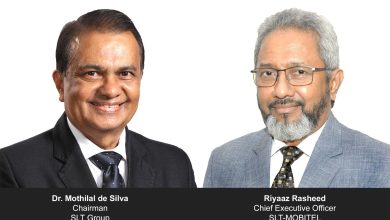CA SRI LANKA
From Oversight to Insight: Directors’ Evolving Role in Governance

A recent session organized by the Policy Advocacy and Economic Contribution Committee of the Institute of Chartered Accountants of Sri Lanka (CA Sri Lanka) focused on the critical need for Directors to be equipped with the essential knowledge and skills for effective governance, strategic oversight and ethical leadership, ensuring that the boards they lead drive organizational success with integrity. The discussion was moderated by the Chairman of the Corporate Governance Committee of CA Sri Lanka, Arjuna Herath, (a former President of the institute); while the eminent panel comprised of Faizal Salieh, the Chairman of the Securities and Exchange Commission of Sri Lanka; Ronnie Peiris, Leadership Coach, Mentor and Consultant; Aroshi Nanayakkara, Chairperson of the Sri Lanka Institute of Directors; and Dr. Harsha Cabral, President’s Counsel and Chairman of National Savings Bank and Tokyo Cement Ceylon PLC.
Arjuna Herath emphasized the importance of the Institute of Chartered Accountants’ Best Practice Corporate Governance Code, which serves as a guiding framework for corporate governance in Sri Lanka. He emphasized the necessity of continuous feedback from the corporate sector and regulators to keep the code current.
Thereafter, Dr. Harsha Cabral noted that while some argue against excessive regulation, rules are essential for effective corporate governance. He referenced historical perspectives on corporate management and the evolution of governance standards, particularly in response to past failures. He highlighted key sections of the Companies Act of 2007, emphasizing directors’ duties, responsibilities and the definition of a director, pointing out that while the Act provides a comprehensive framework, it does not distinguish between different types of directors: all are held to the same standard of care and accountability.
Dr. Cabral also highlighted the broader regulatory environment for public companies, mentioning the need for directors to understand the SEC Act and updated governance codes. He cautioned against appointing unqualified individuals to boards and emphasized that good corporate governance extends beyond profit to encompass the interests of all stakeholders.
His session concluded with practical tips for current and prospective directors, urging them to carefully consider the companies they join, act in the best interest of the organization and maintain a commitment to ethical behavior. Dr. Cabral urged potential directors to examine a company’s history and annual reports to avoid inheriting past issues. Understanding the Companies Act and the company’s Articles of Association is crucial for ensuring compliance with legal obligations.
Meanwhile, Ronnie Peris reflected on the immense responsibilities and potential liabilities that come with directorships, expressing concern over the minimal compensation for the significant risks involved. He questioned the rationale behind accepting such roles given the stress and potential for being unfairly held accountable. He emphasized the need for regulations to be relevant to the local context and cautioned against the excessive costs associated with compliance and internal controls, referencing Stephen Covey’s book on the importance of trust in organizations.
During the session, Faizal Salieh addressed the concept of the standard of care expected from directors, noting the challenges companies face in building an inventory of laws and regulations they must comply with. He highlighted the importance of having a balanced board with diverse expertise, enabling directors to rely on each other’s knowledge. He underscored the necessity for continuous education regarding evolving laws, such as the recently introduced Anti-Corruption Act, which impacts the private sector. He stressed that directors cannot claim ignorance of legal obligations and should prioritize compliance to avoid potential legal repercussions.
Aroshi Nanayakkara went on to discuss the complexities of winding-up regulations, highlighting the critical role of liquidators in managing a company’s assets and liabilities. She expressed concern about the reliance on a single director for specialized knowledge, which can lead to passive engagement from other board members. Emphasizing the need for inclusivity and diversity, she argued that having both men and women on boards is essential for effective governance and to reflect the growing number of qualified women in the workforce. Ultimately, she called for a more dynamic approach to leadership, underscoring the need for directors to prioritize stakeholder value while navigating regulatory complexities.
The panelists emphasized the complex role of directors in balancing competing stakeholder interests, including the dichotomy of conformance versus performance and short-term versus long-term objectives. They expressed concern that the increasing regulatory burden may deter individuals from volunteering to serve on boards. The discussion alluded to rules designed to mitigate risks within the market and to protect investors. They argued for a shift from rule-based governance to goal-based governance, where clear objectives drive business practices without overburdening directors.
Directors must recognize their oversight responsibilities and not let their shareholder interests cloud their judgment in board decisions. The panelists acknowledged the need for stringent regulations but emphasized that these rules should not kill entrepreneurship. They advocated for a balanced approach that promotes enterprise while ensuring accountability.
The session concluded by the eminent panelists urging that the regulatory framework should evolve to address emerging risks, with an emphasis on the importance of competent and aware directors. They called for a culture of accountability and vigilance within boards, encouraging directors to embrace their oversight roles rather than viewing regulatory compliance as a burden.





